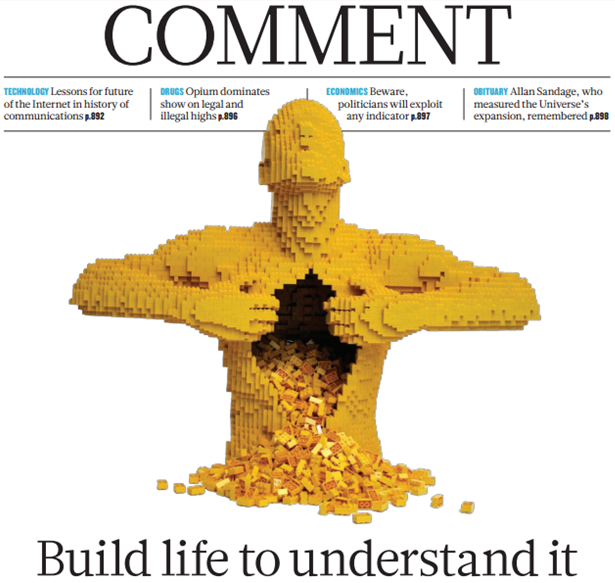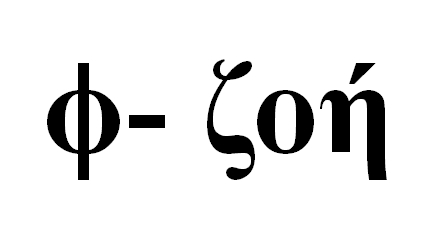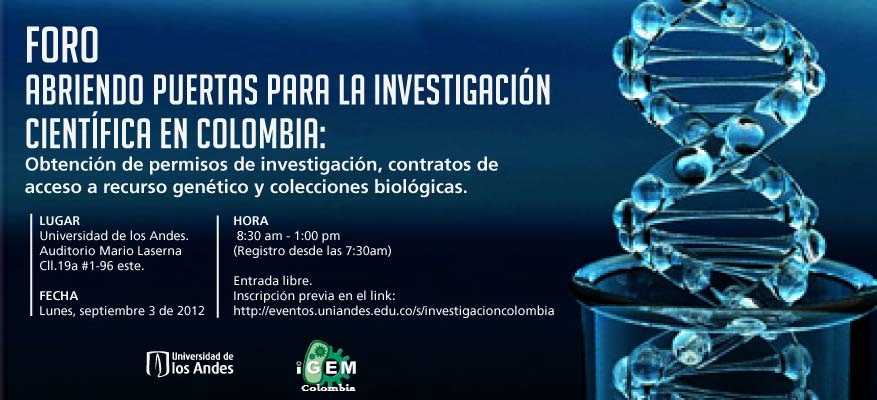Team:Colombia/Human/SynthEthics
From 2012.igem.org
(→Participation in the Sabana University's First Philosophy and Biosciences Workshop) |
(→Participation in the Sabana University's First Philosophy and Biosciences Workshop) |
||
| (25 intermediate revisions not shown) | |||
| Line 16: | Line 16: | ||
| - | [[File: | + | [[File:build.png|thumb|300px|'''Read more''' in [[#References|Elowitz & Lim, 2010 [2] ]]]]For this particular audience, we elaborated a different style of lecture, based in a presentation given by Stanford’s [http://en.wikipedia.org/wiki/Drew_Endy Prof. Drew Endy] during a [http://events.embo.org/12-synthetic-biology/ synthetic biology EMBO workshop] in Buenos Aires, Argentina last April. We skipped the basic biology and molecular biology sections of our usual formula, and decided to focus into the technical, scientific, and social ambitions of synthetic biology. We discussed how the scientific perspective to an emergent technology may be different from the general public political ones, and how interdisciplinary projects together with philosophy may strengthen bioethical initiatives. As always, we followed with a short overview of our project aims and methods. As a means to address the main topics of the workshop, our main point was extracted from the words of Caltech’s [http://en.wikipedia.org/wiki/Michael_Elowitz Michael Elowitz] (Elowitz & Lim, 2010): “''Build life to understand it''”. We proposed synthetic biology as an alternative to understand life and what makes us human, and purposely used expressions such as “create life” or “produce organisms” in order to generate philosophical debates regarding our way to address complexity. We proposed the idea that synthetic biology may stand as a vanguard discipline in the way in which we think about life. Instead of limiting biology’s concern with past and present life forms, synthetic biology may be making an important step forwards into thinking about the organisms that may be. We also stated how the gap between engineering and biology is rapidly shortening, and discussed if philosophy and science may merge again in the future in a similar way. If you are interested in the lecture and the debate click [https://www.dropbox.com/s/xc7o0howmg4lubu/unisabana.mp3 here]! (Sorry, spanish only!). |
| - | [[File:lastMan.jpg|thumb|left|180px]]After our presentation at the workshop, we were given about 30 minutes for questions and debate. There were two main concerns from our audience. The first one questioned synthetic biology feasibility from a biosecurity and bioethical point of view. Since biological causality is nonlinear, that is, since biological events are generally regulated by many others (e.g., because of the cascade properties of intracellular signaling a single change of a signaling protein may have different cellular consequences), Prof. Arana claimed that genetic modifications would be very difficult to perfectly restrict. He stated how things may go out of control and we may end up as | + | [[File:lastMan.jpg|thumb|left|180px]]After our presentation at the workshop, we were given about 30 minutes for questions and debate. There were two main concerns from our audience. The first one questioned synthetic biology feasibility from a biosecurity and bioethical point of view. Since biological causality is nonlinear, that is, since biological events are generally regulated by many others (e.g., because of the cascade properties of intracellular signaling a single change of a signaling protein may have different cellular consequences), Prof. Arana claimed that genetic modifications would be very difficult to perfectly restrict. He stated how things may go out of control and we may end up as [http://en.wikipedia.org/wiki/Johann_Wolfgang_von_Goethe Goethe]'s proverbial “[http://en.wikipedia.org/wiki/The_Sorcerer's_Apprentice_(Dukas) Aorcerer’s Apprentice]”. Additionally, taking into account the high globalization of the current age, he quoted [http://en.wikipedia.org/wiki/J._Robert_Oppenheimer Oppenheimer] and stated that every technologically feasible idea ends up being constructed, and warned us about the danger of proof of concept explorations. Dr. Fernando Lizcano, M.D., based his opinion in a paragraph of [http://en.wikipedia.org/wiki/Francis_Fukuyama Francis Fukuyama]’s book [http://en.wikipedia.org/wiki/The_End_of_History_and_the_Last_Man The End of History and the Last Man], claiming that any particular political and economic interest may be justified by the right person. He claimed that President Obama changed the bioethical committee and searched important Universities for people who would agree with his views. Whether or not this is true in this particular case, it is certainly feasible. |
| - | On the other hand, Prof. José Murillo focused in a more existential aspect of synthetic biology. Our use of controversial expressions earlier teased Prof. Murillo as expected, and he strongly defended how life may not be produced or built, but instead transformed. The reason behind this is the fact that synthetic biology relies on “ingredients” generated by biological processes. He believes that to “build” life is not the only way to understand it, and that the concept of producing life is ambiguous and obscures the reality of life itself. He proposed that one main difference between human generated machines and “biological machines” is that the whole purpose of the former is to accomplish a specific objective. This is their whole meaning of existence. Quoting [http://en.wikipedia.org/wiki/Aristotle Aristotle], life is generated by motion, and a living being is produced only when it sets itself in motion. In this way, machines are not their own movement; they limit themselves to defined functions. Living beings, however, must first function for themselves before being able to ''do'' things. Finally, he questioned the practicality of living beings as engineering scaffolds and we were once again accused of hubris, doing this for the purpose of controlling life instead of pursuing specific advantages of this technology. | + | [[File:elowitz.jpg|thumb|300px| The Sorcerer's Apprentice. Illustration from around 1882 by S. Barth for the original Goethe's Poem]]On the other hand, Prof. José Murillo focused in a more existential aspect of synthetic biology. Our use of controversial expressions earlier teased Prof. Murillo as expected, and he strongly defended how life may not be produced or built, but instead transformed. The reason behind this is the fact that synthetic biology relies on “ingredients” generated by biological processes. He believes that to “build” life is not the only way to understand it, and that the concept of producing life is ambiguous and obscures the reality of life itself. He proposed that one main difference between human generated machines and “biological machines” is that the whole purpose of the former is to accomplish a specific objective. This is their whole meaning of existence. Quoting [http://en.wikipedia.org/wiki/Aristotle Aristotle], life is generated by motion, and a living being is produced only when it sets itself in motion. In this way, machines are not their own movement; they limit themselves to defined functions. Living beings, however, must first function for themselves before being able to ''do'' things. Finally, he questioned the practicality of living beings as engineering scaffolds and we were once again accused of hubris, doing this for the purpose of controlling life instead of pursuing specific advantages of this technology. |
Regarding Prof. Arana’s input, we believe he is right to a certain extent. Although it is true biological systems are chaotic in nature, and that it is true it is very difficult to assure complete understanding of our design’s, this is the exact reason why iGEM HQ has a biosafety requirement. Additionally, this highlights the importance of making mathematical models in order to predict design behaviors and possible glitches. On the other hand, even though it is true that the construction of any feasible technology will not be stopped by particular interests, this doesn’t necessarily mean every conceivable piece of machinery will actually be built. Dr. Fernando Lizcano’s opinion was very important for us since it is possible that political interests may interfere with bioethical initiatives. However, it is important to understand that there are some very well conceived ethical stand points within the scientific community (e.g., regarding stem cell research or climate engineering). This means that even if some crazy idea is accepted by a government decision, the scientific community will not just stand aside. It is also true that there are many instances where gray areas may be found, and this highlights the importance of spreading synthetic biology into pop culture so people may make informed decisions. This was one of our main motivations for the organization of our [https://2012.igem.org/Team:Colombia/Human/Research Research in Colombia forum]. | Regarding Prof. Arana’s input, we believe he is right to a certain extent. Although it is true biological systems are chaotic in nature, and that it is true it is very difficult to assure complete understanding of our design’s, this is the exact reason why iGEM HQ has a biosafety requirement. Additionally, this highlights the importance of making mathematical models in order to predict design behaviors and possible glitches. On the other hand, even though it is true that the construction of any feasible technology will not be stopped by particular interests, this doesn’t necessarily mean every conceivable piece of machinery will actually be built. Dr. Fernando Lizcano’s opinion was very important for us since it is possible that political interests may interfere with bioethical initiatives. However, it is important to understand that there are some very well conceived ethical stand points within the scientific community (e.g., regarding stem cell research or climate engineering). This means that even if some crazy idea is accepted by a government decision, the scientific community will not just stand aside. It is also true that there are many instances where gray areas may be found, and this highlights the importance of spreading synthetic biology into pop culture so people may make informed decisions. This was one of our main motivations for the organization of our [https://2012.igem.org/Team:Colombia/Human/Research Research in Colombia forum]. | ||
| + | [[File:Foro iGELA.jpg|center|700px]] | ||
| - | From this activity, we realized how new technologies change how people think about themselves. This encouraged us to make the decision of extending our outreach not only to students but coffee growers, since they would be the people directly affected by our technology. We realized we had to be very careful as to how to express ourselves, and how our actions could heavily influence the lifestyle of others. With this in mind, we decided to investigate how the emergence of genetics and genetically oriented technologies has impacted society. We thought that by doing this, we would be able to improve our perspective into how to approach different social groups, as well as to understand our responsibility as scientists. | + | Prof. José Murillo's opinion was particularly interesting. It showed us that strong preconceptions may be present even within high academic contexts. To us, Prof. Murillo believes life to be a kind of higher state of being, rather than the coincidence of certain physical conditions. His statements opened our eyes to other kinds of conceptual criticisms and convinced us of the need for healthy legislative and educational campaigns for synthetic biology. This, we believe, is one of the main reasons why Human Practices must be carried out with great effort. |
| + | |||
| + | |||
| + | From this activity, we realized how new technologies change how people think about themselves. This encouraged us to make the decision of [https://2012.igem.org/Team:Colombia/Human/Social:_Schools extending our outreach not only to students but coffee growers], since they would be the people directly affected by our technology. We realized we had to be very careful as to how to express ourselves, and how our actions could heavily influence the lifestyle of others. With this in mind, we decided to investigate how the emergence of genetics and genetically oriented technologies has impacted society. We thought that by doing this, we would be able to improve our perspective into how to approach different social groups, as well as to understand our responsibility as scientists. For this matter, we developed a [https://2012.igem.org/Team:Colombia/Human/Essay short essay] that summarizes our findings. | ||
= References = | = References = | ||
Latest revision as of 02:19, 27 October 2012
Template:Https://2012.igem.org/User:Tabima
Contents |
SynthEthics - A Phylosophical Debate
Introduction
Emerging technologies must not forget to have a clear bioethical stand, and synthetic biology should be no different. Advances in this field may open the door to engineering living systems in a similar way we design new dishwashers, computers or spaceships, and may certainly improve our life quality. However, we are talking about the same engineering has created sophisticated weapons, tanks, and the atomic bomb: synthetic biology could be used for good or bad. Even though we may expect huge benefits from it, there are risks. One major concrete concern refers to the possibility of purposely designing pathogenic strains as a tool for bioterrorism. What was fiction a decade ago, namely the creation of a target population specific pathogen, may aid from advances in tumor specific therapies and recent improvements in DNA synthesis and become a real weapon for xenophobism. To address all these issues, different bodies, agents and organizations have started lively discussions and actions against the potential risks of synthetic biology (discussed on the [http://syntheticbiology.org/SB2.0/Biosecurity_and_Biosafety.html internet site] of the US synthetic biology. Both in the US and in the EU several forums for discussion and documents regarding Biosafety have appeared ([http://www.jcvi.org/research/synthetic-genomics-report/ JCVI Synthetic Genomics - Options for Governance]; [http://www.rathenau.nl/en.html Rathenau Institut]; [http://openwetware.org/wiki/Synthetic_Society/Community_Organization_and_Culture OpenWetWare]). In the case of the EU, some research projects have been funded to analyze the impact and safety problems of Synthetic Biology in Europe ([http://www.synbiosafe.eu SYNBIOSAFE]; [http://www2.spi.pt/synbiology/ SYNBIOLOGY]) (Serrano, 2007). In this way, the success of synthetic biology will depend on its capacity to surpass traditional engineering, blending the best features of natural systems with artificial designs that are extensible, comprehensible, user-friendly, ethical, and most importantly implement stated specifications to fulfill user goals (Andrianantoandro et al., 2006).
Participation in the Sabana University's First Philosophy and Biosciences Workshop
As an attempt to spread the principles of synthetic biology into diverse social populations, we accepted an invitation from the [http://www.unisabana.edu.co/ Sabana University] located in Chía, Colombia to the [http://www.unisabana.edu.co/nc/la-sabana/campus-20/noticia/articulo/primer-workshop-filosofia-y-biociencias-facultad-de-filosofia-y-ciencias-humanas/ first philosophy and biosciences workshop] (11, 12, and 13th of June). The main focus of this event was to address the concepts of “complexity and emergency” from both stand points, as well as to generate very much forgotten dialogues between philosophers and scientists. The main guests ranged from local representatives of the scientific community, to expert philosophers from Spain and Poland. Some of these special guests were [http://investigacion.us.es/sisius/sis_showpub.php?idpers=1210 Prof. Juan Arana], an expert in Philosophy and Contemporary Culture from the Universidad De Sevilla in Spain, [http://201.234.78.173:8081/cvlac/visualizador/generarCurriculoCv.do?cod_rh=0000268186 Dr. Fernando Lizcano], an Endocrinnology specialist from Universidad de la Sabana, Colombia, [http://www.unav.es/adi/servlet/Cv2.ara?personid=33807&pagina=8962&action=ver_pagina&cambia_idioma=2 Prof. José Murillo], an subdirector of the Anthropology and Ethics Institute of the Universidad de Navarra, Spain, among others.

Regarding Prof. Arana’s input, we believe he is right to a certain extent. Although it is true biological systems are chaotic in nature, and that it is true it is very difficult to assure complete understanding of our design’s, this is the exact reason why iGEM HQ has a biosafety requirement. Additionally, this highlights the importance of making mathematical models in order to predict design behaviors and possible glitches. On the other hand, even though it is true that the construction of any feasible technology will not be stopped by particular interests, this doesn’t necessarily mean every conceivable piece of machinery will actually be built. Dr. Fernando Lizcano’s opinion was very important for us since it is possible that political interests may interfere with bioethical initiatives. However, it is important to understand that there are some very well conceived ethical stand points within the scientific community (e.g., regarding stem cell research or climate engineering). This means that even if some crazy idea is accepted by a government decision, the scientific community will not just stand aside. It is also true that there are many instances where gray areas may be found, and this highlights the importance of spreading synthetic biology into pop culture so people may make informed decisions. This was one of our main motivations for the organization of our Research in Colombia forum.
Prof. José Murillo's opinion was particularly interesting. It showed us that strong preconceptions may be present even within high academic contexts. To us, Prof. Murillo believes life to be a kind of higher state of being, rather than the coincidence of certain physical conditions. His statements opened our eyes to other kinds of conceptual criticisms and convinced us of the need for healthy legislative and educational campaigns for synthetic biology. This, we believe, is one of the main reasons why Human Practices must be carried out with great effort.
From this activity, we realized how new technologies change how people think about themselves. This encouraged us to make the decision of extending our outreach not only to students but coffee growers, since they would be the people directly affected by our technology. We realized we had to be very careful as to how to express ourselves, and how our actions could heavily influence the lifestyle of others. With this in mind, we decided to investigate how the emergence of genetics and genetically oriented technologies has impacted society. We thought that by doing this, we would be able to improve our perspective into how to approach different social groups, as well as to understand our responsibility as scientists. For this matter, we developed a short essay that summarizes our findings.
References
- Andrianantoandro, E., Basu, S., Karig, D. K., & Weiss, R. (2006). Synthetic biology: new engineering rules for an emerging discipline. Molecular systems biology, 2, 2006.0028. doi:10.1038/msb4100073
- Elowitz, M., & Lim, W. A. (2010). Build life to understand it. Nature, 468(7326), 889–90. doi:10.1038/468889a
- Serrano, L. (2007). Synthetic biology: promises and challenges. Molecular systems biology, 3(158), 158. doi:10.1038/msb4100202
 "
"



